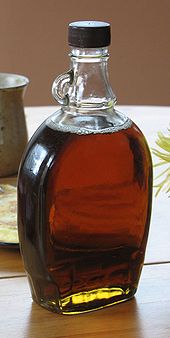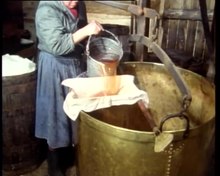Syrup
Syrup (from Arabic شراب šarāb potion via Middle Latin siropus, sirupus, sugar juice; sugary, viscous medicinal potion) is a viscous, concentrated solution (concentrate) obtained by boiling and other techniques from sugary liquids such as sugar water, sugar beet juice, fruit juices or plant extracts. Due to its high sugar content, it can be kept for a long time under exclusion of air, even without refrigeration. Syrup is used for beverages, desserts and as a medicinal form, also - especially the sugar beet syrup - as a spread as well as a dough additive for sweetening and colouring in cooking or baking (see: gravy, brown cakes, rye bread/wholemeal bread).
To make fruit syrup, boil the fruit with a little water and juice it. The strained liquid is mixed with sugar, boiled again and then filled into hot rinsed bottles (see boiling down). In Germany, commercially produced fruit syrups for mixing with water or soda water were popular until the 1970s, but then largely fell into disuse. The best known brand was Tri Top. In the course of the spread of drinking water bubblers, the supply of syrup also grew again.
Commercially available raspberry or woodruff syrup (especially known as an additive for Berliner Weiße) is in most cases made from concentrated sugar solution, flavourings and colourings - it is therefore not fruit syrup.
Syrup-like substances also occur naturally, such as honey.
In the food industry, syrups play an important role, especially as cold-produced juice concentrates (thick juice). Here, it is less the shelf life that is important than the reduced weight during transport. For example, orange juice is traded internationally almost exclusively as syrup (orange juice concentrate) and is only diluted to the original concentration with water before bottling. Glucose syrup, a concentrated sugar solution obtained enzymatically or chemically from carbohydrate-rich plants such as corn, potatoes or wheat, is also frequently used as a substitute for the more expensive beet or cane sugar.
In the Middle Ages and early modern period in particular, a wide variety of syrups (such as Sirupus acetosus, Sirupus contra omnem fluxum ventris, Sirupus de fumo terre, Sirupus de papavere, Sirupus Galeni, Sirupus rosatus and Sirupus violatus) were used, for example, as laxative or diarrhoea remedies, digestive remedies, remedies that altered the balance of juices in the body or invigorating remedies.
Various syrups such as lime sugar and grenadine are used as a base for lemonades and for mixing cocktails. Lime Juice Cordial, which is often used in cocktails, differs from lime syrup in that it has a lower sugar content.
Well-known suppliers of industrially produced syrups are Monin, Giffard, Anton Riemerschmid, Tri Top and Fabbri.

A bottle of maple syrup

Play media file Video: Cooking apple cabbage in Belgium, 1980
Special species
- Fruit syrup: apple cabbage, pear cabbage
- Sugar syrup
- Sugar beet syrup (Rübenkraut and other names)
- Agave syrup
- Maple syrup
- Syrupus Simplex
- Top honey - a type of syrup made with fir or spruce shoots.
- Molasses - sugar syrup
- Spelt Syrup
- Dandelion syrup
- Rice syrup
- Wheat Syrup
- Corn Syrup
- Potato Syrup
- Malt syrup or malt extract
- Rob: preparation obtained by boiling down fruits or parts of plants, with no added sugar
- Grenadine syrup
Search within the encyclopedia